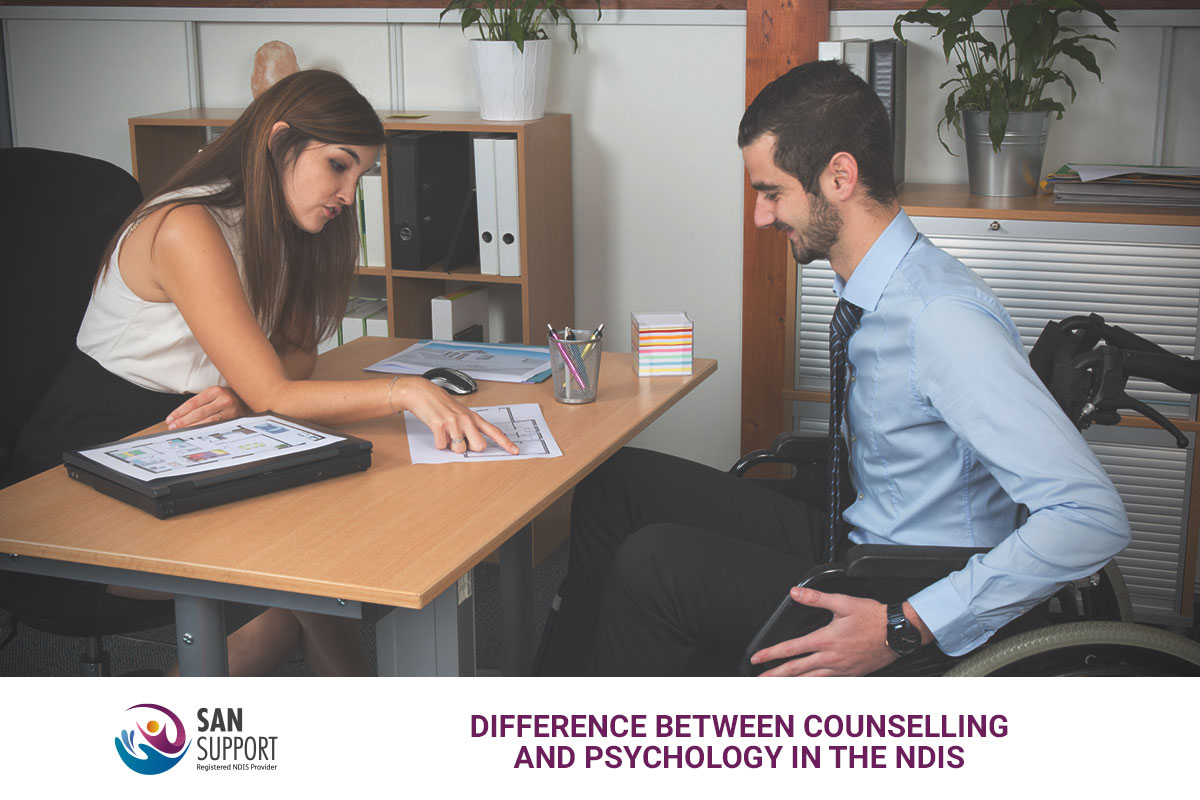
Are you trying to decide between counselling and psychology for your mental health needs under the NDIS? You are not alone. Many NDIS participants wonder which service is right for them. While both counselling and psychology aim to improve mental well-being, they take different approaches, serve unique purposes and are suited for different situations. Let us break down the differences to help you make an informed decision.
What Is Counselling in the NDIS?
Counselling offers emotional support and practical guidance to help you navigate life’s challenges. Counsellors focus on helping participants deal with immediate issues, build coping strategies and enhance overall well-being. If you are looking for someone to help you manage stress, grief, or relationships, counselling might be the right choice.
Key Features of Counselling
- Immediate Support: Counselling focuses on addressing current challenges, such as anxiety, stress, or low self-esteem.
- Solution-Oriented Approach: Counsellors help you develop practical strategies to overcome obstacles and improve your quality of life.
- Non-Diagnostic: Unlike psychologists, counsellors do not diagnose mental health conditions but focus on helping you manage personal and emotional difficulties.
Who Are Counsellors?
Counsellors are trained professionals registered with recognised organisations, such as the Australian Counselling Association (ACA). They must meet specific educational and ethical standards to provide high-quality care.
Benefits of Counselling
- Accessibility: Counselling services are often more affordable and widely available compared to other mental health supports.
- Personalised Strategies: Sessions are tailored to your specific needs, offering practical tools to improve your day-to-day life.
- Focus on Everyday Issues: Whether you are dealing with stress, grief, or low confidence, counselling provides immediate and actionable support.
What Is Psychology in the NDIS?
Psychology takes a deeper approach to mental health. Psychologists assess, diagnose and treat a wide range of mental health conditions, including more complex and long-term issues. If you are dealing with severe symptoms or need evidence-based therapies, psychology might be the best fit.
Key Features of Psychology
- Comprehensive Assessment: Psychologists provide detailed evaluations to understand your mental health and identify underlying causes of your symptoms.
- Evidence-Based Therapies: They use scientifically proven methods, such as Cognitive Behavioural Therapy (CBT) and Acceptance and Commitment Therapy (ACT), to treat mental health conditions effectively.
- Long-Term Focus: Psychology often involves longer-term therapy to address root causes and ensure sustainable improvements.
Who Are Psychologists?
Psychologists undergo extensive education and training, typically completing at least six years of university study, including supervised clinical practice. They must also be registered with the Australian Health Practitioner Regulation Agency (AHPRA), ensuring they meet strict professional standards.
Benefits of Psychology
- ,and Diagnosis: Psychologists can diagnose and treat a variety of mental health conditions, ensuring you receive appropriate care.
- Tailored Treatments: They design therapy plans based on your unique needs, helping you achieve long-term mental health goals.
- Support for Complex Needs: If you are dealing with severe mental health issues or a long-term condition, psychologists provide specialised support.
Key Differences Between Counselling and Psychology
Although both services aim to improve your mental health, counselling and psychology differ in several key ways. Counselling is best for addressing immediate, everyday challenges, such as stress or grief, while psychology provides a deeper, evidence-based approach to treating mental health conditions.
Counselling focuses on practical, short-term solutions, while psychology takes a long-term approach to address root causes. The choice between the two depends on the complexity of your mental health needs and the type of support you are seeking.
How to Choose the Right Service for You
Deciding whether to choose counselling or psychology under the NDIS depends on your personal needs, preferences and goals. Here is a simple way to decide:
Choose Counselling If:
- You are experiencing mild emotional distress, such as stress or grief.
- You are looking for short-term support to address specific life challenges.
- You want practical strategies to build confidence or improve relationships.
Choose Psychology If:
- You have a diagnosed mental health condition, such as depression or PTSD.
- You need evidence-based therapies for moderate to severe symptoms.
- You are looking for long-term support to address the root causes of your challenges.
Why Choosing the Right Support Matters
Accessing the right mental health support under the NDIS can make a significant difference in your life. By understanding the roles of counselling and psychology, you can better align your choice with your personal goals and challenges.
Key Steps to Make the Right Decision:
- Identify Your Needs: Reflect on the type of support you require. Are you facing immediate challenges, or do you need long-term help with a diagnosed condition?
- Talk to Your NDIS Planner: During your planning meeting, discuss your mental health needs. They can help you understand what supports are available and how to include them in your plan.
- Stay Open to Adjustment: Your needs may evolve over time. Regularly review your supports and consider whether counselling or psychology might better suit your changing circumstances.
Empowering Your Mental Health Journey
Mental health is a vital part of overall well-being. Whether you choose counselling for short-term guidance or psychology for comprehensive care, accessing the right service ensures you are supported every step of the way.
Taking the time to understand your options equips you with the knowledge to make choices that positively impact your life. With the NDIS, you have the opportunity to access personalised services that empower you to navigate challenges, achieve your goals and live a fulfilling life.
Why Understanding the Difference Matters
Knowing the difference between counselling and psychology can help you access the right support and make the most of your NDIS plan. Counselling provides practical, short-term solutions for everyday challenges, while psychology offers in-depth, evidence-based care for more complex mental health needs. At SAN Support, we are committed to helping you find the services that best suit your needs. By choosing the right mental health support, you can take meaningful steps toward achieving your goals and improving your well-being. Reach out today to explore your options and take control of your mental health journey.
